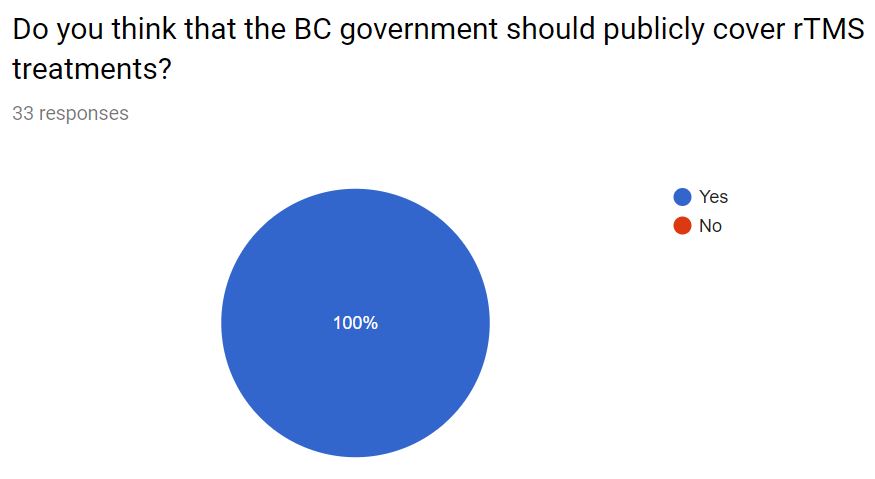HTAC Survey Results Show Support for Provincial rTMS Funding
By. Kevin Jiang

“I have struggled with cyclical depression for approximately 20 years. I have tried many medications and alternative treatments. rTMS has proven to be the most effective treatment I have found.”
The NINET-IMH Clinic & Laboratory has submitted a nomination to the BC Health Technology Assessment Committee (HTAC) requesting provincial rTMS funding. HTAC is responsible for recommending medical technologies to the BC Government, based on their merit for public coverage. If they decide to review rTMS for depression and make a favourable recommendation, it would be a first and crucial step for providing free rTMS treatment across the province.
To support our nomination, we sent out a survey early January asking the public to voice their opinions of the procedure. From the over 30 responses we’ve received so far, the feedback has been overwhelmingly positive.
“For the first time in my 50 years I am creating goals and feel optimistic about my future,” wrote one anonymous respondent. “I am alive today because of rTMS.”
When reading about medicine, it’s not often we get to hear the patient’s perspective. That’s why, over the coming week, we will be publishing the anonymous survey responses on this blog as well as Twitter. heir voice is important, and they deserve to be heard.
Curious about rTMS? Here’s a quick primer.
According to our previous study, rTMS boasts an impressive 47 to 49 per cent response rate at reducing depressive symptoms. Complete remission, or elimination of all depressive symptoms, was experienced by 27 to 32 per cent of the over 400 patients studied (1). Compare this to SSRIs or SSNRIs, two types of antidepressant drugs. Although reports vary, for moderate to severe depression, these display a success rate of around 20% (accounting for placebo) (2).
“I had to try 15 different medications… before my doctor would let me try TMS. None of the meds gave much if any improvement in my mood. The TMS treatment has significantly improved my mood.”
Medication and rTMS aren’t mutually exclusive either; research has shown the two treatments, when combined, could have synergistic effects. According to one study, rTMS could hasten the response to antidepressant drugs in patients suffering from major depressive disorder (3). What’s important is that rTMS provides hope for patients suffering from depression who haven’t found efficacy in treatments like psychotherapy or medication.
“It gives me some hope that there may be a treatment that could help me after a 40 -year struggle to live with my [bipolar] depression.”
That’s not to say rTMS is better than antidepressant drugs. We’re all machines. If you’re missing parts, get a replacement. Unfortunately, rTMS treatments are not covered by the MSP in British Columbia. While it’s provincially funded in Alberta, Quebec and Saskatchewan, here in BC, patients need to rely on private clinics for their treatment.
“I am on very limited income,” one respondent wrote, “but have still paid for treatment as well as travel costs because this was the only treatment that worked for me.”
An rTMS treatment course in private clinics may range between $3,000 to $5,000 – potentially unaffordable for many suffering from depression.
“rTMS is a life-changing and life-saving medical treatment. Other life-saving medical interventions are covered by BC Medical. To not fund this treatment is sending a message that mental illness is not a valid medical condition.”
Every patient we’ve surveyed have expressed desires for the provincial government to fund this treatment. That might not be enough. During the process of assessing this technology, it is critical the public is engaged and provides input. If you’re living with mental illness and have experienced rTMS personally, or if you’re wanting to receive rTMS but have no access to it, please consider sharing your experience through the survey below:
I think we’re all sailors, navigating by the stars. Sometimes they’re hard to see. The sky’s overcast, the city’s too bright. The waves are rough and you have to fight just to stay afloat. Sometimes, it’s hard to remember why you sail at all. But there are moments, sometimes weeks, sometimes minutes, when the sea lies still. When the wind is fair and the air is bright. When the stars are out. And you stand on the bow and realize the beauty of it all. These are the moments we must remember. Because no matter how overcast the sky and cold the sea, the storm will always pass. When it does, and you stand up on shaky knees to peer over the horizon, maybe you’ll finally find land.
And hey. You’re doing good.
References
- Blumberger, Daniel M, et al. “Effectiveness of Theta Burst versus High-Frequency Repetitive Transcranial Magnetic Stimulation in Patients with Depression (THREE-D): a Randomised Non-Inferiority Trial.” The Lancet, vol. 391, no. 10131, 2018, pp. 1683–1692., doi:10.1016/s0140-6736(18)30295-2.
- Institute for Quality and Efficiency in Health Care. (2018, December 06). Depression: How effective are antidepressants? Retrieved February 21, 2019, from https://www.informedhealth.org/depression-how-effective-areantidepressants.2125.en.html?part=behandlung-yi3.
- Rossini, D., Magri, L., Lucca, A., Giordani, S., Smeraldi, E., & Zanardi, R. (2005). Does rTMS Hasten the Response to Escitalopram, Sertraline, or Venlafaxine in Patients With Major Depressive Disorder? A Double-Blind, Randomized, Sham-Controlled Trial. The Journal of Clinical Psychiatry, 66(12), 1569-1575. doi:10.4088/jcp.v66n1212
Incredible to see this technology is effective for people. Hopefully this will become more available and wide used in the 2020’s.